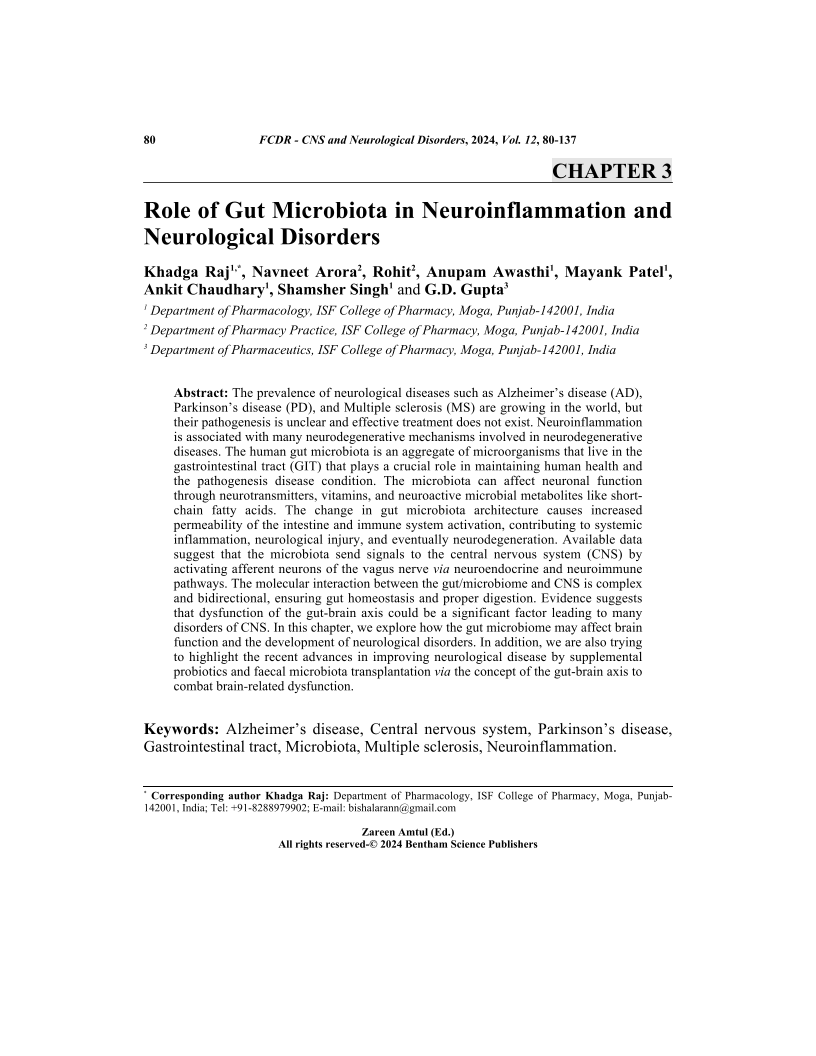Role of Gut Microbiota in Neuroinflammation and Neurological Disorders

- Authors: Khadga Raj1, Navneet Arora2, Rohit3, Anupam Awasthi4, Mayank Patel5, Ankit Chaudhary6, Shamsher Singh7, G.D. Gupta8
-
View Affiliations Hide Affiliations1 Department of Pharmacology, ISF College of Pharmacy, Moga, Punjab 142001, India 2 Department of Pharmacy Practice, ISF College of Pharmacy, Moga, Punjab-142001, India 3 Department of Pharmacy Practice, ISF College of Pharmacy, Moga, Punjab-142001, India 4 Department of Pharmacology, ISF College of Pharmacy, Moga, Punjab-142001, India 5 Department of Pharmacology, ISF College of Pharmacy, Moga, Punjab-142001, India 6 Department of Pharmacology, ISF College of Pharmacy, Moga, Punjab-142001, India 7 Department of Pharmacology, ISF College of Pharmacy, Moga, Punjab-142001, India 8 Department of Pharmaceutics, ISF College of Pharmacy, Moga, Punjab-142001, India
- Source: Frontiers in Clinical Drug Research - CNS and Neurological Disorders: Volume 12 , pp 80-137
- Publication Date: March 2024
- Language: English
Role of Gut Microbiota in Neuroinflammation and Neurological Disorders, Page 1 of 1
< Previous page | Next page > /docserver/preview/fulltext/9789815179842/chapter-3-1.gif
The prevalence of neurological diseases such as Alzheimers disease (AD), Parkinsons disease (PD), and Multiple sclerosis (MS) are growing in the world, but their pathogenesis is unclear and effective treatment does not exist. Neuroinflammation is associated with many neurodegenerative mechanisms involved in neurodegenerative diseases. The human gut microbiota is an aggregate of microorganisms that live in the gastrointestinal tract (GIT) that plays a crucial role in maintaining human health and the pathogenesis disease condition. The microbiota can affect neuronal function through neurotransmitters, vitamins, and neuroactive microbial metabolites like shortchain fatty acids. The change in gut microbiota architecture causes increased permeability of the intestine and immune system activation, contributing to systemic inflammation, neurological injury, and eventually neurodegeneration. Available data suggest that the microbiota send signals to the central nervous system (CNS) by activating afferent neurons of the vagus nerve via neuroendocrine and neuroimmune pathways. The molecular interaction between the gut/microbiome and CNS is complex and bidirectional, ensuring gut homeostasis and proper digestion. Evidence suggests that dysfunction of the gut-brain axis could be a significant factor leading to many disorders of CNS. In this chapter, we explore how the gut microbiome may affect brain function and the development of neurological disorders. In addition, we are also trying to highlight the recent advances in improving neurological disease by supplemental probiotics and faecal microbiota transplantation via the concept of the gut-brain axis to combat brain-related dysfunction.
-
From This Site
/content/books/9789815179842.chapter-3dcterms_subject,pub_keyword-contentType:Journal -contentType:Figure -contentType:Table -contentType:SupplementaryData105

